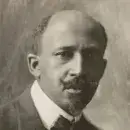
W. E. B. Du Bois
W. E. B. Du Bois was a towering figure in sociology, history, and Pan-African civil rights, and a founder of the NAACP. He was the first African American to receive a doctorate (1895) from Harvard University. His publications include The Souls of Black Folk (1903), Black Reconstruction in America (1935), and Dusk of Dawn (1940). In 1905, Du Bois led the founding of the Niagara Movement calling unequivocally for civil and political rights for African Americans, which served as the precursor to the NAACP. In 1910, he created and served as editor of the NAACP’s journal The Crisis, and under his guidance, the journal attracted a wide readership, reaching one hundred thousand in 1920, and established the NAACP as the leading organization for Black Americans.
Du Bois was also active in the Pan-Africanist movement, attending the First Pan-African Conference in London in 1900 and organizing a series of Pan-African Congress meetings around the world in 1919, 1921, 1923, and 1927, bringing together intellectuals from Africa, the West Indies, and the United States. Du Bois later served as the director of special research at the NAACP from 1944 to 1948. In this role, he attended the founding convention for the United Nations, lobbying the UN to acknowledge the suffering of Black Americans. He authored the NAACP publication, An Appeal to the World, a precursor to a report charging the United States with genocide for its history of state-sanctioned lynchings. Du Bois also brought attention to the injustices of colonialism, urging the UN to take a stand against exploitative colonialist powers.
In his last years, Du Bois began an ambitious project to create a new encyclopedia on the African diaspora, funded by the government of Ghana. At the age of ninety-three, Du Bois moved to Ghana to manage the project, acquiring citizenship there in 1961 after the United States confiscated his passport.